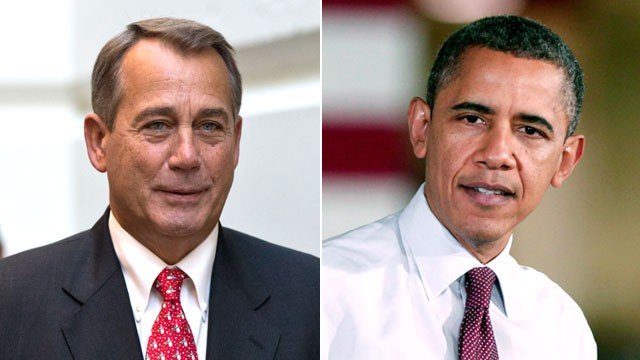
Republicans in the House of Representatives have met President Barack Obama amid renewed efforts to avert a looming debt crisis.
Both sides described the 90-minute meeting as useful but said no decision was made. They agreed to keep talking.
Republicans have offered the president a short-term debt limit increase to stave off default.
A new poll suggests the majority of Americans blame the Republicans for the partial shutdown of government.
A Wall Street Journal/NBC News poll suggests 53% of Americans blame the Republicans for the crisis, compared with 31% who say the Democrats are responsible.
“It was a very adult conversation,” said Republican Hal Rogers of the meeting.
“Both sides said they were there in good faith.”
House Majority leader Eric Cantor called the meeting “very useful” and said the talks were continuing.
The White House said in a statement: “The president looks forward to making continued progress with members on both sides of the aisle.”
Officials have warned the US risks default on October 17 if the nation’s borrowing limit is not increased.

Republicans have offered to extend the government’s borrowing authority beyond the deadline, temporarily putting off a default.
In return they want Barack Obama to further negotiate on the budget dispute that has partially closed the government – the first shutdown for 17 years.
It is not clear if Republicans are willing to drop entirely their attempts to defund or delay Barack Obama’s 2010 healthcare law.
Leading Republican Pete Sessions said the two sides were working on “defining parameters to see if we can make progress”.
Earlier, House of Representatives Speaker John Boehner said Republicans had told Barack Obama they wanted “a temporary increase in the debt ceiling” followed by talks on “a way forward to reopen the government.”
“It’s time for leadership,” the Ohio Republican said.
“It’s time for these negotiations and this conversation to begin.”
A spokesman for John Boehner told reporters the deal offered was a “clean” increase of the debt limit, with no additional policies attached.
It would only last six weeks – until November 22.
Reacting to the offer, White House press secretary Jay Carney told a daily press briefing the president was glad that “cooler heads” seemed to be prevailing in the House.
But he added: “He will not pay ransom in exchange for the Republicans in the House doing their job.”
Earlier on Thursday, Democratic Senate leader Harry Reid said the Senate would “look at anything” the House sent to them, but they would not engage in negotiations with Republicans prior to reopening the government.
The impasse over the debt limit has already rattled markets and increased the interest rate for one-month US Treasury bills. But US stock markets rebounded on Thursday on news of a possible breakthrough.
Democratic Senate finance committee chairman Max Baucus said the Republican campaign to undermine the healthcare law in return for agreeing to end the shutdown was “not up for debate” and would not happen.
Hundreds of thousands of federal employees have been out of work since the shutdown began, and private firms, from arms makers to motels, have begun to lay off workers.
About 15,000 private-sector employees have filed for unemployment benefits due to the shutdown, the US labor department said on Thursday.
And governors in at least four western states – Utah, South Dakota, Arizona and Colorado – have asked for authority to reopen national parks within their borders because of the economic impact of the closures.
On Thursday, Barack Obama signed legislation restoring death benefits to families of US troops who have died since the government closed. The shutdown prevented processing of the payments, typically made within days of the soldier’s death.
The president also met House Democrats at the White House on Wednesday and told them he would prefer a longer-term increase to the nation’s $16.69 trillion debt ceiling.
But the president said he was willing to accept a short-term rise in the borrowing cap to “give Boehner some time to deal with the Tea Party wing of his party”, Representative Peter Welch told the Associated Press news agency after the meeting, referring to a Republican faction of hard-core conservatives.
Earlier, Treasury Secretary Jack Lew told a congressional panel that skipping a payment on US debt would trigger a potentially profound financial crisis.
“It would be chaos,” Jack Lew told the Senate hearing.
Since the US hit its debt ceiling in May, the treasury has been using what are called extraordinary measures to keep paying the bills, but those methods will be exhausted by October 17, Jack Lew has said.
[youtube wpm3bRPP-Ok]